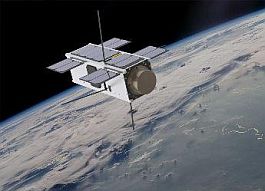Education and Science, Good for Business, Lithuania, Technology
International Internet Magazine. Baltic States news & analytics
Sunday, 12.05.2024, 19:44
Lithuanian engineers build country's first space satellite
 Print version
Print version |
|---|
The National Space Association of Lithuania, which was later renamed Lithuanian Space Association, was set up in 2009, many laughed.
Young professional engineers from Lithuania want to prove that Lithuania can proudly participate in space exploration along with the United States, Russia, China, or India, reports LETA/ELTA.
Laurynas Maciulis, one of the creators of the Lithuanian space satellite Kosmis, emphasized that the researchers' main aim is to prove that Lithuania can and should make its voice heard on the worldwide aeronautics arena.
US National Aeronautics and Space Administration (NASA) visited Lithuania almost two years ago and suggested building a Lithuanian satellite.
"When I learned about a possibility to build a Lithuanian satellite, I had no doubt whatsoever that, with a little effort, it was possible. That was an excellent opportunity to use my knowledge. Ever since that day, I would wake up and go to sleep thinking about a Lithuanian satellite," one of the founders of the Kosmis project, Vytenis Buzas said.
Maciulis revealed that his main objective in this project is to inspire Lithuanian youths to take interest in space technology. Even if the launch fails, the project will still have achieved its educational goals.
The young engineers currently intern at NASA Ames research center to improve their knowledge. The Lithuanian project was introduced to colleagues at the research center and received much support. Russians, too, showed interest in the project. However, the biggest obstacle that the Lithuanian engineers still need to overcome is lack of funding.
Scientists have been investing their own money into the project that could become the start of Lithuanian space infrastructure.
"Lack of funding is no excuse. That is a creator's responsibility, since he is the one who must prove to others that the idea is useful and worthy of investment. We go by this principle and look for funding sources in both private and public sector," stated Maciulis.
The network of small satellites – the so-called CubeSats – will serve in a long-term research of the lower thermosphere and ionosphere.
Until now, up to 100 universities applied to take part in the QB50 project, but only 50 satellites will have a place in the rocket.








 «The Baltic Course» Is Sold and Stays in Business!
«The Baltic Course» Is Sold and Stays in Business!

